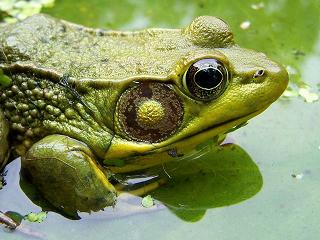The white-centrism of vegan advocacy is perhaps best evidenced in its partiality for single-issue campaigns targeting the practices of non-Western cultures.
Take, for instance, the 2013 Free From Harm call to action regarding “live sushi.” “Live sushi” entails the presentation of butchered, living animals such as frogs to demonstrate freshness of product. Free From Harm sensationalizes this practice as one associated with foreigners for a presumed white audience. The petition it promotes promises to ban the practice if only this presumed white audience were to join together to police and control non-white deviants.
From the petition:
This barbaric, vulgar and unnecessarily cruel practice is truly a shame on the Japanese people. So we, signers of this petition from around the world, ask respectfully that you ban this practice in Japan.
White-led nonprofits engage cruelty rhetoric from a colonialist perspective: Western violent practices are invisibilized, while non-Western violent practices are framed as “vulgar.” The presumption being that Westerners possess the correct morality and the appropriate solutions to social ills.
 Single-issue campaigning creates a competition for attention. As a result, social problems deemed most easily sold to the public are prioritized, and they frequently take advantage of racism, sexism, and other inequalities to improve resonance. The Nonhuman Animal rights movement, in other words, exploits human injustice to promote nonhuman justice.
Single-issue campaigning creates a competition for attention. As a result, social problems deemed most easily sold to the public are prioritized, and they frequently take advantage of racism, sexism, and other inequalities to improve resonance. The Nonhuman Animal rights movement, in other words, exploits human injustice to promote nonhuman justice.
Single-issue campaigns are thus fundamentally arbitrary in their focus. They have more to do with the prejudices of campaigners and their public than the relative suffering of the Nonhuman Animals in question. Indeed, the practice of keeping victims conscious during consumption extends far beyond Japan. Many Asian cultures engage this practice. For instance, there are soup recipes that feature live prawns swimming in steaming broth and octopus hot pots in which a living octopi’s arms are cut off with scissors bite by bite for the duration of the meal.
In the United States, Americans torture, dismember, and intentionally sicken and traumatize millions of rats, mice, birds, pigs, dogs, cats, monkeys, and other animals before eventually killing them days, months, or even years later in vivisection and military testing. Thousands of Americans traipse into woods, penned enclosures, rivers, and oceans to shoot other animals with bullets, arrows, and harpoons or snag their faces with metal hooks. These animals are also fully conscious, suffering, and are often dismembered and disemboweled, before being killed and eaten.
Really, then, speciesism is a global issue. There is nothing especially “barbaric, vulgar and unnecessarily cruel” about what happens to animals in Japanese food systems. Yes, “live sushi” entails the spectacle of an animal’s suffering as they die for the consumer’s pleasure, but Westerners value the spectacle of speciesist violence as well. Thus, it isn’t the spectacle that is the issue for Western petitioners, it is the cultural context.
“Live sushi” consumption takes place outside the framework of traditional Western practice. As has been the practice for several centuries, Westerners are quick to frame the culture of non-Westerners as “barbaric” and “savage” to justify global inequality and Western imperialism. Nonprofits and activists in the West must be mindful of this legacy when framing their social justice efforts, lest they inadvertently aggravate inequality in the process.
While I do not believe that anti-speciesist organizations are ignorant of the cultural contexts that shape their audience’s interpretations, some activists do make half-hearted appeals to the suffering of all Nonhuman Animals, not just those harmed by the practice in question. In doing so, they seek to leverage the non-white/non-Western cruelties highlighted by the campaign to build support for a wider vegan ethic. However, such an approach will not be enough to counter the racist and colonialist culture that translates their message. When met with criticisms of sexism, for instance, PETA counters that it uses men in its sexualized campaigning as well, but this does not negate the sexist cultural context in which PETA’s message will be read. We do not live in a post-gender world, and we do not live in a post-racial world. There are repercussions for vulnerable groups when campaigns of this kind are promoted.
The potential for aggravating racist and colonialist attitudes is a problem particular to single-issue campaigns. Single-issue campaigns are intended to otherize and create a sense of “we-ness” to motivate action. Unfortunately, in doing so, these campaigns create divisiveness and invite stereotyping. Advocating for all animals with a holistic vegan approach can combat speciesism without drawing ethnic/racial boundaries or appealing to paternalism.
Intersectional failure in the Nonhuman Animal rights movement alienates marginalized human populations in its fervor to liberate Nonhuman Animals. Many like to believe they live in a post-racial utopia where race, ethnicity, and nationality do not matter . . . but they do. The majority of Western vegan activists and nonprofit leaders are white and middle-classed and Western nonprofits are the most influential in the global charity system. This imbalance nurtures a privileged worldview that will shape decision-making and campaign development to the potential detriment of others.
For further information on resisting intersectional failure in campaign development, I recommend a panel talk by Dr. Breeze Harper of the Sistah Vegan Project and Lauren Ornelas of Food Empowerment Project: Animal Liberation, Tokenizing ‘Intersectionality’, and Resistance Ecology:
Note: Following the controversy in the article’s comments section, the Free From Harm article discussed here was been edited to reduce inflammatory elements and the comments section was closed.
This essay was originally published on The Academic Activist Vegan on June 9, 2013.

Readers can learn more about single-issue campaigning in my 2016 publication, A Rational Approach to Animal Rights. Receive research updates straight to your inbox by subscribing to my newsletter.

